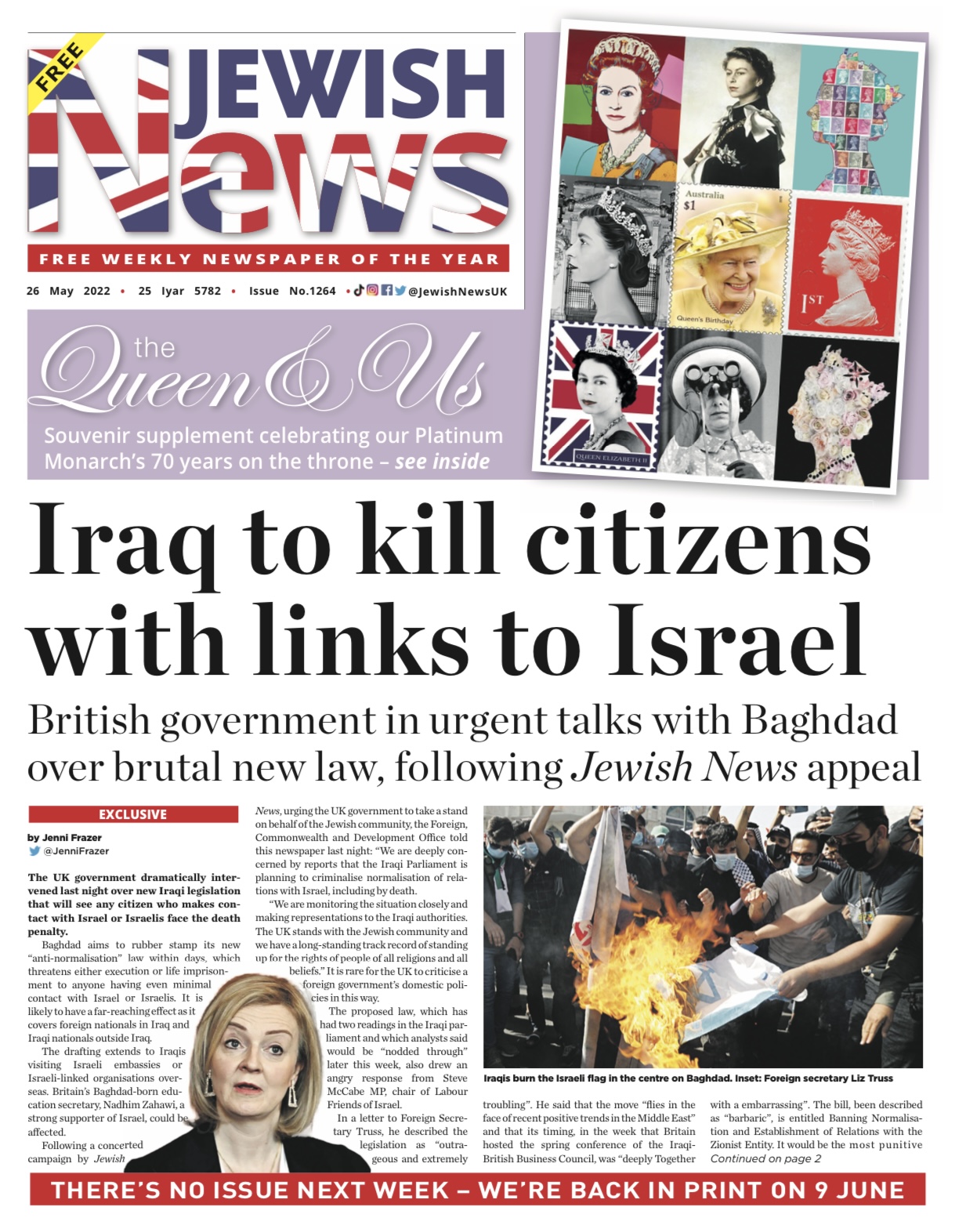UK ministers in urgent talks with Baghdad over death penalty for contacting Israel
EXCLUSIVE: Government makes dramatic intervention after Jewish News draws attention to bill being discussed in Iraqi parliament
Jenni Frazer is a freelance journalist

The UK government dramatically intervened last night over new Iraqi legislation that will see any citizen who makes contact with Israel or Israelis face the death penalty.
Baghdad aims to rubber stamp its new “anti-normalisation” law within days, which threatens either execution or life imprisonment to anyone having even minimal contact with Israel or Israelis. It is likely to have a far-reaching effect as it covers foreign nationals in Iraq and Iraqi nationals outside Iraq.
The drafting extends to Iraqis visiting Israeli embassies or Israeli-linked organisations overseas. Britain’s Baghdad-born education secretary, Nadhim Zahawi, a strong supporter of Israel, could be affected.
 Following a concerted campaign by Jewish News, urging the UK government to take a stand on behalf of the Jewish community, the Foreign, Commonwealth and Development Office told this newspaper last night: “We are deeply concerned by reports that the Iraqi Parliament is planning to criminalise normalisation of relations with Israel, including by death.
Following a concerted campaign by Jewish News, urging the UK government to take a stand on behalf of the Jewish community, the Foreign, Commonwealth and Development Office told this newspaper last night: “We are deeply concerned by reports that the Iraqi Parliament is planning to criminalise normalisation of relations with Israel, including by death.
“We are monitoring the situation closely and making representations to the Iraqi authorities. The UK stands with the Jewish community and we have a long-standing track record of standing up for the rights of people of all religions and all beliefs.” It is rare for the UK to criticise a foreign government’s domestic policies in this way.
The proposed law, which has had two readings in the Iraqi parliament and which analysts said would be “nodded through” later this week, also drew an angry response from Steve McCabe MP, chair of Labour Friends of Israel.
In a letter to Foreign Secretary Truss, he described the legislation as “outrageous and extremely troubling”. He said that the move “flies in the face of recent positive trends in the Middle East” and that its timing, in the week that Britain hosted the spring conference of the Iraqi-British Business Council, was “deeply Together with a embarrassing”. The bill, been described as “barbaric”, is entitled Banning Normalisation and Establishment of Relations with the Zionist Entity. It would be the most punitive anti-Israel law in the Arab world. Once enacted, the law would cover all of Iraq, including the semi-autonomous region of Kurdistan.
It would be the most punitive anti-Israel law in the Arab world. Once enacted, the law would cover all of Iraq, including the semi-autonomous region of Kurdistan.
Iraq’s ruling coalition is headed by anti-Western Shia cleric Muqtada al-Sadr, who introduced the bill. His cousin, Jaafar al-Sadr, is Iraq’s ambassador to the UK and speaker at this week’s Iraq Britain Business Council (IBBC) conference in London, which promised “networking and business opportunities”.
The IBBC is sponsored by UK companies, including Standard Chartered, BP, Shell, Mott MacDonald, G4S, PWC and Serco, as well as the University of Northampton and Bath Spa University.
Muqtada al-Sadr, described by many as ‘the absolute kingmaker’ of the next Iraqi government, has also issued a proclamation that at Friday prayers, worshippers must shout out “No, No to Israel, No No, to normalisation, No, No to the occupier”.
Baroness Nicholson of Winterbourne, who is the prime minister’s trade envoy for Iraq and president of the IBBC, was due to chair a meeting of the All-Party Parliamentary Group on Iraq in parliament on Wednesday, where the proposed law was on the agenda. She said a number of Iraqi MPs were due to attend this session and that the IBBC was a “non-political” body and was therefore not in a position to issue any comment on the intended legislation.
Lord Howell of Guildford, who was keynote speaker at the IBBC conference, had not previously been aware of the intended law and what he called its “horrific measures”, but told Jewish News he believed it was being discussed by British MPs and “is of obvious concern”.
The bill bans “contact and communication of any kind and means with the occupying Zionist entity, its nationals, and representatives, whether individuals or institutions or organisations, for any reason”.
It also bans any “financial or moral assistance” to Israel or Israeli organisations. Anyone found guilty would face “execution or lifelong imprisonment”.
The bill bans “contact and communication of any kind and means with the occupying Zionist entity, its nationals, and representatives, whether individuals or institutions or organisations, for any reason”.
Board of Deputies vice-president Edwin Shuker, who was born in Iraq, called the bill “barbaric” and “an affront to Iraq and the good people of Iraq with whom we grew up, who desire peace, and to reconnect with Iraqi Jews wherever they have been displaced”.
He said: “This is state-sponsored terrorism against civilians and I for one have shelved any plans to visit the country or to connect with it, even though I am a British citizen.
“I call on the British government to demand clarifications and to take the appropriate measures against such brutality.”

Thank you for helping to make Jewish News the leading source of news and opinion for the UK Jewish community. Today we're asking for your invaluable help to continue putting our community first in everything we do.
For as little as £5 a month you can help sustain the vital work we do in celebrating and standing up for Jewish life in Britain.
Jewish News holds our community together and keeps us connected. Like a synagogue, it’s where people turn to feel part of something bigger. It also proudly shows the rest of Britain the vibrancy and rich culture of modern Jewish life.
You can make a quick and easy one-off or monthly contribution of £5, £10, £20 or any other sum you’re comfortable with.
100% of your donation will help us continue celebrating our community, in all its dynamic diversity...
Engaging
Being a community platform means so much more than producing a newspaper and website. One of our proudest roles is media partnering with our invaluable charities to amplify the outstanding work they do to help us all.
Celebrating
There’s no shortage of oys in the world but Jewish News takes every opportunity to celebrate the joys too, through projects like Night of Heroes, 40 Under 40 and other compelling countdowns that make the community kvell with pride.
Pioneering
In the first collaboration between media outlets from different faiths, Jewish News worked with British Muslim TV and Church Times to produce a list of young activists leading the way on interfaith understanding.
Campaigning
Royal Mail issued a stamp honouring Holocaust hero Sir Nicholas Winton after a Jewish News campaign attracted more than 100,000 backers. Jewish Newsalso produces special editions of the paper highlighting pressing issues including mental health and Holocaust remembrance.
Easy access
In an age when news is readily accessible, Jewish News provides high-quality content free online and offline, removing any financial barriers to connecting people.
Voice of our community to wider society
The Jewish News team regularly appears on TV, radio and on the pages of the national press to comment on stories about the Jewish community. Easy access to the paper on the streets of London also means Jewish News provides an invaluable window into the community for the country at large.
We hope you agree all this is worth preserving.





















